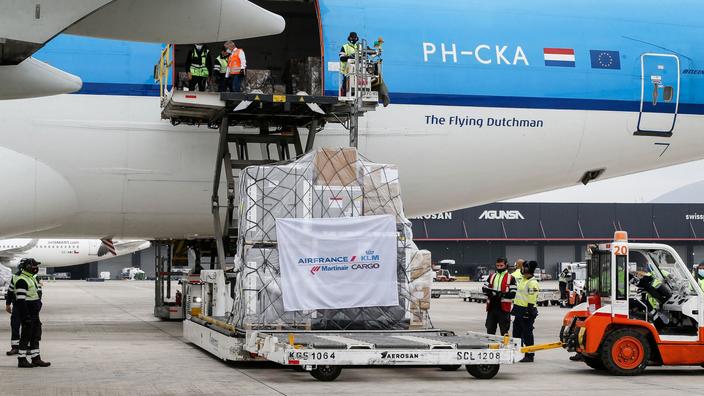After Israel, it is the turn of the United States to celebrate a successful vaccination campaign with 45% of its population first vaccinated.
For its part, France crossed the 25% mark in early May with more than 16 million first doses injected.
In all, in the world, since the beginning of December, a billion doses have been distributed but they are unevenly distributed.
Rich countries concentrate 47% against only 0.2% for lower income countries.
One in four people is vaccinated in some rich countries against one in 500 in some poor countries, estimated in mid-April, the head of the World Health Organization (WHO), Tedros Adhanom Ghebreyesus.
To discover
Covid-19: instructions for use of self-tests
Read also: Covid-19: Covax weighs 5% of global vaccination
"
It's time to share
», Declared Emmanuel Macron on April 23 on the occasion of the sending of the first 105,000 French doses of the AstraZeneca vaccine to West African countries as part of the Covax program. Initiated at the end of February under the aegis of the WHO, the objective is to provide equitable access to vaccination throughout the world. Around 100 countries are joining forces to deliver 500 million doses by the end of the first half of 2021 to 121 lower-income nations, mainly in Africa, South America, Asia and Oceania. A program whose cost currently amounts to three billion dollars, two of which have been provided by the United States. An investment that is still largely insufficient, according to the WHO, which recommends an additional $ 5 billion for the program to be effective.
Two months after the first dose injected into the President of Ghana, where is the international system?
Many delays caused by the Indian crisis
Only 50 million doses of the 100,000 planned have been distributed. "
We will be between two and four months late on deliveries,
" informs Nathalie Ernoult, researcher at the Institute for International and Strategic Relations (IRIS) and co-director of the Observatory for Global Health. Asked by
Le Figaro
, the specialist points to several reasons for this delay. The first is logistics, "setting
up such a system in times of crisis is not easy and requires a lot of international coordination
". In addition, “
the idea of putting rich countries and poor countries in an emergency situation on the same level was a bit unrealistic
,” she adds.
The countries which could have directly developed direct agreements with the laboratories
”in spite of the countries with lower incomes which were not able to accede to this form of health nationalism.
Read also: India: vaccination slows as the Covid-19 epidemic accelerates
Finally, the last difficulty is the epidemic outbreak in India which has not only flooded the country's health system, but also undermined international vaccine aid. Lower production, closed borders, national preference, India almost no longer exports its precious doses of Astra Zeneca despite the international program which is 75% dependent on it. A strategic choice made by the world health authorities, based on a more affordable price and better storage conditions compared to Pfizer or Moderna sera which require to be stored in refrigerators between -15 ° C and 25 ° C. Without a dose from India, the Covax program is slowing down. "
We are already between two and four months late for deliveries
», Deplores Nathalie Ernoult.
To avoid these shortage situations, it is advisable to diversify your sources of supply.
It is with this in mind that Moderna has promised the delivery of 500 million doses.
The first vials of this messenger RNA vaccine should be delivered in minority this year, the rest being scheduled for 2022, said the Vaccine Alliance, the main partner in the operation.
We will therefore have to be patient.
How to speed up the process to prevent new variants from emerging again and giving rise to fears of an impossible exit from the crisis?
Should vaccine patents be lifted to produce more of them?
Lift patents to increase orders?
Requested by 170 heads of state and Nobel laureates including François Hollande in an open letter to Joe Biden, published last April, the lifting of patents could allow new laboratories to mass produce vaccines. A request that the United States finally said in favor on Wednesday April 5. “
The extraordinary circumstances of the Covid-19 pandemic call for extraordinary measures
,” said US Trade Representative Katherine Tai. An initiative with which the French president has aligned himself and which has delighted the entire international community up to the UN summit, which thus hopes to "significantly
increase the supply of the Covax system
".
Read also: Are you in favor of the lifting of patents on Covid vaccines?
For Nathalie Ernoult, this lifting of patents is "
a step
" which should serve as a stepping stone to a multiplication of production centers such as Bangladesh for example. Finally, she recalls that the multiplication of doses will not be enough to vaccinate the entire world population, still cautious in some countries. As an example, she cites the Democratic Republic of Congo which has refused more than a million doses and redirected them to other African nations such as Ghana which has already administered nearly 900.00 doses for 30 million inhabitants. In the meantime, “
Governments with currently excess doses must share those doses with us so that we can deliver them where they are needed most.
“Asks the spokesperson for the Vaccine Alliance (GAVI), requested by
Le Figaro
. For its part, France, "a
pioneer in the Covax device
", is preparing to send its second major vaccine delivery. Destination still unknown.

